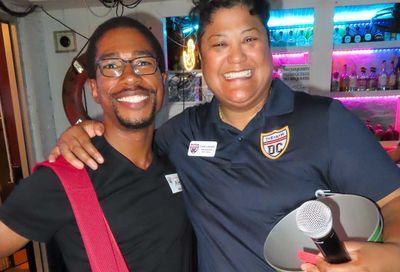South Dakota governor wants to remove collegiate sports from anti-trans athlete ban
Gov. Kristi Noem has launched a nationwide coalition to "defend Title IX" seeking to pressure NCAA into excluding trans athletes

After weeks of being the most vocal cheerleader of a bill to bar transgender athletes from competing in sports based on their gender identity, South Dakota Gov. Kristi Noem (R) is urging lawmakers to change language in the bill to limit the ban to students attending primary and secondary schools.
Following passage of a bill to bar transgender female athletes from competing in women’s sports, Noem tweeted that she was “excited to sign” the bill, but sent the measure back to the legislature late Friday with suggestions to change the language, as part of a maneuver known as a “style and form veto.”
Noem told lawmakers in a letter that the bill’s approach to collegiate sports would be “unrealistic,” as it would directly counter what is currently NCAA policy.
Under the NCAA rules, a transgender athlete may compete in sports based on their gender identity if they are stable in their transition and have undergone hormone therapy and other gender-affirming care for more than a year.
Opponents of the bill had warned that the NCAA could deny South Dakota the opportunity to host various sports championships — and the money spent by players and fans benefitting the local economy — if the measure were to pass.
The NCAA currently asks potential host cities bidding on championships if there are any anti-LGBTQ laws in place that would run counter to its assurances that athletes and fans will be “welcomed and treated with respect.”
The organization can also threaten to enforce such a promise by yanking championships from states with laws hostile to LGBTQ people, as it did in 2016 in response to a North Carolina law seeking to bar transgender people from using restrooms matching their gender identity in government- or publicly-owned buildings.
Ultimately, Noem blinked, sending the bill, HB 1217, back to lawmakers, asking them to exempt collegiate sports from the ban. She also suggested striking a section that would allow students to sue schools for violations of the law and a provision requiring all schools to annually collect proof of athletes’ assigned sex at birth, according to The Ridgefield Press.
A majority of lawmakers in both chambers can approve Noem’s changes on March 29. If they do not, the bill would die — unless lawmakers can muster votes from two-thirds of lawmakers in both chambers to enact the bill as originally passed, in defiance of the governor.
But the original bill had previously encountered a hiccup in the Republican-controlled Senate, with lawmakers bringing up the exact issues now raised by Noem, and managed to be revived only through use of a special legislative maneuver.
Additionally, the bill’s sponsor, Rep. Rhonda Milsteaad, is incensed at Noem’s suggested changes, accusing the governor of overstepping her authority by using her veto to change crucial parts of the bill instead of merely cleaning up language.
“She has literally gutted the bill and rewritten the bill,” Milstead told The Ridgefield Press.
Sioux Falls Sports Authority, the business organization that hosts NCAA tournaments in the city, has been opposed to the bill, saying it will hinder their chances of attracting NCAA tournaments to Sioux Falls.
The organization estimates that up to 100 full- and part-time jobs could be risked by the bill’s passage, not to mention the loss of millions in revenue.
Opponents of the bill decry the fact that it singles out transgender student-athletes for discrimination, and argue that the bill is unnecessary.
According to the South Dakota High School Activities Association — which has its own stringent policies regarding athletes’ ability to compete — there are currently no transgender students competing in girls’ high school sports, and only one transgender girl has ever competed in a girls’ sport in the association’s history, and did not disadvantage the ability of cisgender girls to compete for titles or honors.
LGBTQ advocates have lobbied the governor, urging her to veto the bill and holding protests outside the State House. But they have been unsuccessful in setting up a meeting with the governor.

“We’re really calling on Gov. Noem and legislators to recognize the serious physical, emotional and psychological harm that this would cause trans kids across South Dakota,” Susan Williams, who heads the Transformation Project, said. “In short, it threatens their lives.”
But Noem, seeking to quell the controversy over HB 1217, has since shifted her focus, announcing on Monday she was forming a “nationwide” coalition to “defend Title IX.”
The coalition seeks to gain enough support in various states to pressure the NCAA into revoking its policy allowing transgender athletes to compete based on their gender identity, or obtaining a promise from the NCAA that it will no longer penalize states with anti-LGBTQ laws.
Throughout a news conference on Monday, Noem said that HB 1217 is not an anti-transgender bill, but is simply about “defending women’s sports.” She also objected to the idea that her new coalition was about transgender rights, seeking to frame it as “protecting” women’s athletic opportunities.
Regarding the economic fallout from HB 1217, Noem said the changes she proposed should protect against that, and said she was looking forward to signing the bill once lawmakers adopt her proposed changes.
“I believe that boys should play boys’ sports, and girls should play girls’ sports,” she said.
The American Civil Liberties Union of South Dakota blasted Noem’s actions.
“Title IX protects all students — including those who are transgender — from discrimination based on sex,” Jett Jonelis, the advocacy manager for the ACLU of South Dakota, said in a statement. “If Gov. Noem really wanted to protect fairness in women’s sports, she would tackle the actual threats to women’s sports such as severe underfunding, lack of media coverage, sexist ideologies that suggest that women and girls are weak, and pay equity for coaches. This coalition is clearly fueled by a fear and misunderstanding of transgender people.”
Jonelis also criticized Noem’s last-minute changes to HB 1217 as insufficient, arguing that any ban on transgender athletes is discriminatory.
“It doesn’t matter what House Bill 1217 ends up looking like,” they said. “House Bill 1217 has never been about leveling the playing field for student athletes. It’s been obvious from the beginning that this discriminatory legislation is about creating problems that don’t exist and, in the process, harming some of the most vulnerable people in our state.
“These attacks on trans women and girls are rooted in the same kind of gender discrimination and stereotyping that has held back cisgender women athletes for centuries,” Jonelis added. “Transgender girls are often told that they are not girls based on inaccurate stereotypes about biology, athleticism and gender. Trans girls are girls — period. This is an attempt to erase transgender people from society.”
Read more:
Right-wing podcast suggests gay Captain America will ‘battle AIDS’
Fort Lauderdale’s gay mayor under fire for honoring anti-LGBTQ church and school
Tennessee’s “Slate of Hate” features 11 bills targeting LGBTQ people
Support Metro Weekly’s Journalism
These are challenging times for news organizations. And yet it’s crucial we stay active and provide vital resources and information to both our local readers and the world. So won’t you please take a moment and consider supporting Metro Weekly with a membership? For as little as $5 a month, you can help ensure Metro Weekly magazine and MetroWeekly.com remain free, viable resources as we provide the best, most diverse, culturally-resonant LGBTQ coverage in both the D.C. region and around the world. Memberships come with exclusive perks and discounts, your own personal digital delivery of each week’s magazine (and an archive), access to our Member's Lounge when it launches this fall, and exclusive members-only items like Metro Weekly Membership Mugs and Tote Bags! Check out all our membership levels here and please join us today!


























You must be logged in to post a comment.